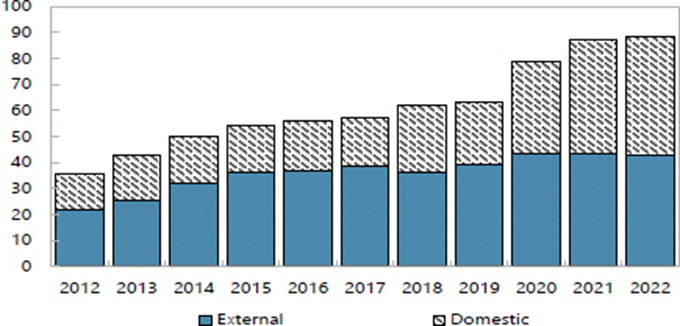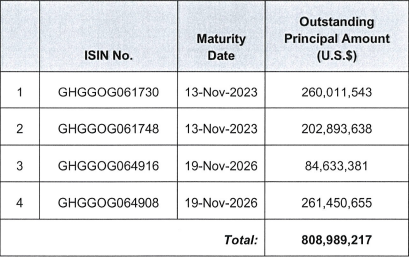Debt Exchange: Pension funds and US$-denominated bonds
Tano Osei, London, UK
December 22, 2023
T he Government of Ghana closed the first batch of the country's Domestic Debt Exchange Program (DDEP) on Friday 10th February 2023. The voluntary exchange recorded a rate of participation of over 95 percent of bond holders. Boiled by this success, the government announced two additional domestic public debt restructuring in July, 2023. In this second wave, the program offered to exchange approximately US$809 million of its US$-denominated domestic notes and bonds1. Second, the final and last domestic restructuring program offered to exchange US$2.6 billion (GH₵31 billion) eligible bonds for a package of new bonds2.
Domestic debt reached 45.7 percent of GDP in 2022 (of which 16 percent of GDP was held by the Bank of Ghana) compared to external public external debt,which stood at 42.4 percent of GDP3.
Decomposition of Public Debt, (2022, Before DDE)

Source: International Monetary Fund, 2023
Domestic dollar-denominated bonds
The government of Ghana began issuing dollar-denominated bonds in 2016. This was part of a wider borrowing program called the ‟domestic multi-currency bond program”. The was exploring ‟alternative sources of funding for meeting the financing needs of the Government as well as further develop and deepen the capital market in Ghana through the introduction of a new investment product”4. In the bond offer brochure, the government highlighted two key objectives which weret to reduce refinancing risks, diversify the investor base and reduce the contentration of currency structure of the public debt portfolio. The US dollar denominated bonds were sucessful and attracted investors from outside and inside of Ghana.
Outstanding USD-denominated bonds

Source: Ministry of Finance, 2023
After the first issue, commercial banks had the largest holdings with 52.5 percent. The Bank of Ghana bought the second largest holding with 21.5 percent, leaving 26 percent for institutional and individual investors outside and inside of Ghana. Subsequent issues attracted more financial institutions, so much so that at the end of 2023, deposit banks held 84.6 percent, corporates and institutions and institution 8.5 percent and insurance companies 0.1 percent. Foreign investors (non-resident investors) held around 7.6 percent. Creditors who agreed to exchange their debt instruments under the DDE, received new bonds due 2027 and 2028 with respective interest rates of 2.75 percent and 3.25 percent.
Pension funds exchange
On July 31st 2023, pension funds bonds holders received a memorandum of understanding (MoU), containing a detailed description of the financial terms of the bond exchange. The government offered eligible bond holders accrued interest on the bonds but without principal payments of any kind.
The law allows pension to invest up to 75 percent of their assets into government bonds (Ghana Gazette, September 14th 2021). Pension funds held 6 percent of Ghanaian domestic public debt worth US$20.1 billion (GHC181 billion) at the end of September 2022, according to data from the Central Securities Depository. Ghana pension funds had also invested substantially in E.S.L.A and Daakye bonds, which enabled the governement to wrap these two special bonds into the exchange program.
On September 4th, 2023, the government announced the conclusion and settlement of its offer to pension funds bond holders. The next day, the government began payments to holders of new exchange bonds under the terms of the exchange memorandum. These payments covered tranches (or coupons) of treasury bonds and also of E.S.L.A and Daakye bonds. Figures from the ministry of finance show that 95 percent of pension funds bond holders accepted in the exchange.
-
E.S.L.A Bonds
Energy Sector Levy Act (E.S.L.A) was a law that gave the power to the government to raise funds for the struggling power sector. The authorities institutionalized the concept and created a special purpose vehicle (SPV) which had the power to issue long-term bonds. E.S.L.A proceeds funded power generation and a new scheme to improve the collection of electricity receivables. The government used a part of the proceeds to repay US$840 million (GH₵ 10 billion) that the state-owned electricity company owed to banks, trade creditors and sub-contractors.
-
Daakye Bonds
The Daakye Trust Plc is a special purpose vehicle that the mandate to issue bonds for the funding of the pre-tertiary to the tertiary educational infrastructure. A securitization mechanism based on receivables from another fund (the GETFund) provided evidence of cash flow to support the bond issue. The Ghana Education Trust Fund (GETFund) is a public trust set up by an Act of Parliament in 2000. Its mandate is also to provide funding for the educational system. The government subsequently listed the Daakye debt instruments on the Ghana Fixed Income Market (GFIM).
Pension funds hold a large proportion of Daakye and E.S.L.A bonds.
Related Articles
BIBLIOGRAPHY
1❩
Ministry of Finance (2023): Memorandum for the US$ denominated notes and bonds Domestic Debt Exchange - https://mofep.gov.gh/sites/default/files/basic-page/Ghana-US$DDE-Exchange-Memorandum.pdf
See also Ministry of finance (2023): Commencement of domestic debt exchange in respect of Ghana’s U.S.$ denominated domestic bonds - https://mofep.gov.gh/sites/default/files/basic-page/Ghana-US$-Domestic-Deb-%20Exchange.pdf
2❩
Ministry of Finance (2023): Memorandum Ghana Domestic Debt Exchange for Pension Funds Exchange - https://mofep.gov.gh/sites/default/files/basic-page/Ghana-DDE-Pension-Funds-Exchange-Memorandum_0.pdf
See also Ministry of finance (2023): Alternative offer for the pension fund exchange - https://mofep.gov.gh/sites/default/files/basic-page/Ghana-Pension-Funds-DDE-2023.pdf
3❩ International Monetary Fund (2023): Ghana: Request for an Arrangement Under the Extended Credit Facility-Press Release - https://www.elibrary.imf.org/view/journals/002/2023/168/002.2023.issue-168-en.xml
4❩ Central Securities Depository Ghana (2016): https://www.csd.com.gh/market-info/market-news/13197-debut.html
